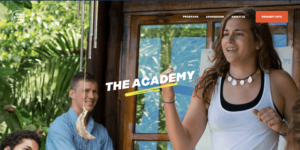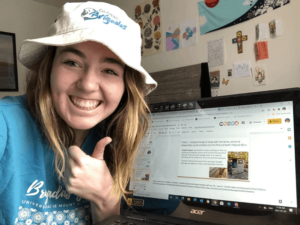Why Global Should Be the Education Movement of 2017

By Bonnie Lathram and David Potter
As we close the year out, we are pondering:
Where are we headed in the field of education in 2017?
In a year in education that was focused on equity, we know we still have much work to do to create more equitable opportunities and access to learning for all students on the planet. As mission-driven organizations, here’s what we are committed to in the coming year:
- To support high-quality educational opportunities for students, we aim to connect education leaders, teachers and edtech developers to the work that is happening to scale innovations in learning.
- To spread stories that unite rather than divide, we aim to explore and highlight the best ideas and investment to create educational opportunity for all students across the planet.
- To coalesce the field and to scale best practices, we want you to get involved with us. Create resources, join conversations, highlight what’s working and share your expertise so we can foster equitable and high-quality education across the planet.
In 2017, we are going to be powered by global innovations in learning. Here’s our look at powerful trends and highlights from 2016, and where we are headed and what we will be discussing in the new year.
The End of Average
The Programme for International Student Assessment (PISA), an international test administered by the Organization for Economic Cooperation and Development (OECD), recently released test results that show the U.S. is slightly above average in science and reading, and below average in math. This year, we heard Todd Rose speak at SXSWedu about the end of average. Will an increased focus on personalization yield the end of average?
And what can we learn from those results moving forward? There’s a lot we can learn, including what high performing countries do to achieve quality results. As Julie Keane and Tania Tani wrote, “In high performing systems around the world, effective teacher learning and improved teacher practice have been identified as top strategies to increase student learning and school improvement. Teacher engagement is also a great strategy for retention—a key component for school success.”
Comparison through PISA results is important in terms of knowing where we are and who we can look to for exemplars and best practices. A focus on improved teacher practice is paramount to success. In 2017, let’s look to teachers to share resources, learn from one another and collaborate across the planet as professional learning becomes continual, perpetual and global.
Tech Improvements
Technology and learning innovations are in the process of boosting global IQ. As they become less expensive and more widely available, they will connect billions of young people to the idea economy. Last year, we categorized 20 inventions that are influencing education around the world. In 2016, we launched our campaign #AskAboutAI with a focus on how machine learning and artificial intelligence are changing life as we know it on planet earth.
Also this year, Bill Taylor wrote about 3 Steps for Educators to Take Advantage of OERs, Katie King looked at blockchain, Emily Leibtag highlighted a student digital badging system, and Michael Bodekaer was confident that virtual reality is coming to a classroom near you.
In 2017, we expect global connections to proliferate everywhere, especially through Twitter chats, Edcamps, Google Hangouts, Skype and the Hour of Code. We expect open educational resources have a deeper impact on teaching and learning with emerging platforms such as Participate Learning, Amazon Inspire, and OER Commons further connecting millions of learners worldwide.
The Future of High-Quality PBL
We read Paul Tough’s latest book this year, Helping Children Succeed: What Works and Why (and also interviewed him on the Getting Smart Podcast). It turns out relationships and instructionally sound pedagogy are the biggest levers for helping all students succeed. Tough quotes deeper learning network leaders including Ron Berger of EL Education and Bob Lenz of Buck Institute for Education, formerly of Envision Schools, about high-quality project-based learning and student agency.
At Getting Smart, we have spent the last year focused on project-based learning using the lens of equity and the economy (see our “It’s a Project-Based World” campaign page for more). We also wrote about this in two publications that came out this year: Preparing Students for a Project-Based World and Preparing Teachers for a Project-Based World.
In 2017, we expect to see more collaborative, online and in-person professional development and student curriculum focused around projects. Our organizations are also collaborating with over 100 organizations in the U.S. and internationally to support high-quality PBL. For more on this project, see Bob Lenz’s article What We are Doing to Ensure High-Quality PBL for All and 30 Leaders on the Successes and Challenges of High-Quality PBL.
The Rise of Global Networks
As Tom Vander Ark wrote, “School networks are one of the most important innovations in the modern era of U.S. K-12 education. Charter management organizations (CMO) have grown to more than 2,200 schools and get all the attention–good and bad. But networks connecting district schools are equal in scale and have also made an important contribution.”
Evidence confirms that deeper learning environments positively influence student academic outcomes and social-emotional factors. A study of student performance at deeper learning network schools in California and New York, conducted by the American Institutes for Research, found that attending deeper-learning schools had a significant positive impact, on average, on students’ content knowledge and standardized-test scores. Three-fifths of the students in the study were low-income, and their scores improved just as much as the scores of the students who were above the low-income cutoff.
We’re excited by the potential impact of school networks worldwide connecting and addressing the 17 Sustainable Development Goals. The power of local networks connected globally could create a “network effect” for quality education for all. Imagine the impact of Fundacion Nueva Escuela (Colombia), KATEV (Kazakhstan), Study Hall Education Foundation (India) and Spark Schools (South Africa) with Big Picture Learning.
These types of global school connections will be supported by Asia Society’s new Center for Global Education and the Partnership for 21st Century Learning, which new CEO David Ross and Board Chair David Young are committed to expanding from a domestic effort into a global movement.
Moreover, the PISA 2018 assessment aims to build “a single scale that measures to what extent students are able to use their knowledge and understand, recognize relationships and perspectives, and think critically about a specific global or intercultural issue.” This new PISA emphasis will give schools worldwide even more incentive to collaborate across time zones and around global issues.
The Power of Stories
The public narrative framework provides a great way to share stories, especially with the current “us vs. them” mentality on social media. Stories bind us together, and we are best doing so in ways that inspire collective rather than showcase one perspective. In our content in 2017, we aim to share personal stories that unite us in core values and themes of agency, equity, empathy and inquiry.
What Do These Trends all Have in Common?
As we move forward, our focus will be on major themes including inquiry, equity, empathy and agency.
- Agency. We seek to explore innovations that promote self-directed learning and student agency over their own work. This includes a focus on entrepreneurial models, student projects and personalized learning for student voice and choice.
- Empathy. Social intelligence is the global skill for the future of work. According to recent Pew Report, employers look to those who have the ability to connect with others as a job skill. With increased automation, where does human value lie? Empathy is it.
- Equity. The most important qualifier for our work is this: Does this move learning forward for ALL kids in a way that supports those furthest from opportunity?
- Inquiry. We are looking toward new models and global networks that encourage student inquiry, including innovations in project-based learning and deeper learning.
Call to Action
We challenge you to join us in creating a #SmartPlanet. Be a globally connected educator and invite others to join too.
- Connect. Sign up at Participate Learning to access FREE online resources and join in the conversation with other globally aware educators.
- Create. Create a resource on Participate Learning to share, or comment on someone else’s. Check out the specific resources for our #SmartPlanet series.
- Share. Join a #GlobalEd chat via the Participate Learning platform to share your own best practices and learn from others. If you are interested in sharing your story about innovations in learning and global competence, please email [email protected] with the title “Smart Planet.” See our guest posting policies for more.
This blog is part of our #SmartPlanet series in partnership with Participate. Check out #SmartPlanet to engage in the conversation on social media. Head over to Participate.com to view and create lessons and join a community of educators promoting global education in the U.S. and around the world.
For more, see:
- 5 Best Practices to Globalize Your School
- Two Foundations for Sustaining Equitable Education Strategies
- Empowered Educators Lead to Engaged, Higher Achieving Students
Stay in-the-know with all things EdTech and innovations in learning by signing up to receive the weekly Smart Update. This post includes mentions of a Getting Smart partner. For a full list of partners, affiliate organizations and all other disclosures, please see our Partner page.








WEI ZHANG
That thought is fantastic! Global educators will have a great brain storm on this activity!
Pablo giudici
Love this website and the amazing things it offers!
Simone
Global education will indeed make learning experiences more meaningful
Chris Gunnoo
Hi
I have always been a lifelong learner and I believe in networking and sharing. This is missing in my school and my country. It's difficult to get people connected and investigating on education and thinking about the future. I got into elearning but I got stuck. Now I am in robotics but I again do not have any help. I spend my own salary on buying kits then experiment with my students.
Hope global education is the solution. I have started a club at the college and I find the students keen interests in robotics. So anybody who wants to help me researching on integrating robotics in science subjects would be most welcomed.